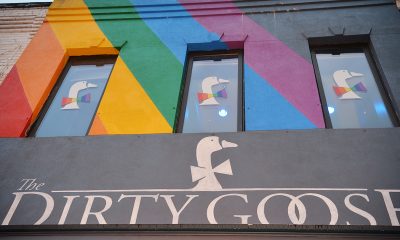Arts & Entertainment
Year in review: A taste of Washington
Sampling many of the new restaurants in D.C. this year kept one food fan busy


A sampling of the array of baked goodies available at Grassroots Gourmet (Washington Blade photo by Michael Key)
New restaurants, new chefs, new menus and new food all kept a food lover and restaurant column writer busy this year in D.C.
Every day a new place was opening, some I was able to review, others are still on my list. When all was said and done however, I had the opportunity to dine in some of the best restaurants in town and enjoy some of the finest food offerings available. And in the process I got to expand my own horizons.
Since taking on this project, friends and family have asked how such a picky eater has taken on the task of reviewing restaurants. The answer is always the same: “I fell into it, but why does being picky disqualify me from writing about restaurants?”
Then, in August, I realized that I may be in a bit over my head, so I brought two knowledgeable foodies to Izakaya Seki, the first restaurant I was concerned about not being knowledgeable enough to cover fairly.
Izakaya Seki opened in August by father and daughter Hiroshi and Cizuka Seki; this new establishment features traditional Japanese dishes and delicacies. Delicacies such as cuttlefish; at that point I had no idea how it was even supposed to taste. Other items like the fresh scallop Carpaccio were delightful and set the tone for three hours of delicious food. Izakaya Seki still remains one of my most challenging and rewarding columns to date.
While Japanese cuisine was outside my comfort zone, there were many other restaurants this year I felt well prepared to write about. Ristorante Posto, in Logan Circle, was serving a new spring selections when I first set foot into this unsuspecting location, and a new pastry chef was dishing out delicious deserts. The pastry chef has since left, but Posto remains a favorite spot for delicious Italian food and brick oven pizzas. In May, at a Taste of Pride featured special, I discovered Jack Rose Dining Saloon. The food was excellent and in an environment where whiskey bottles reached toward the ceiling, I discovered I enjoy scotch.
Mike Isabella, gay chef Jamie Leeds, and Taylor Gourmet all opened new locations this year. Isabella’s Bandolero in Georgetown serves up his take on traditional Mexican dishes and strong margaritas. Standouts included the course we dubbed “Mexican Sushi,” like the blue crab taquito with coconut and red chili. The suckling pig tacos and the nachos with crispy goat and goat cheese also pleased all the diners at the table.
For Leeds, and her new Hank’s on the Hill she teamed up with “mixtress” Gina Chersevani, whose Eddy Bar is a key component of the new space. This new 40-seat location serves up Leed’s classics like the lobster roll and the Meat and Two option, as well as Chersevani’s exquisite “storytelling” cocktails. Longtime friends Casey Patton and David Mazza opened up a third Taylor Gourmet on 14th Street this year. These traditional Philadelphia-inspired sandwiches battled against sandwich shop Sun-de-Vich — Taylor won for best cold cut-based sandwiches and Sun-de-Vich won for its creative and worldly offerings. Sandwich lovers are in for a treat at either location.
Carnivores also have plenty of new options.
Gay business partners David Winer, Josh Hahn and Antonio Oquendo opened their fifth restaurant in D.C. called The Pig, a pork-centric restaurant that focuses on snout-to-tail dishes from locally sourced ingredients. The braised pork cheek was a favorite and if you’re up for the challenge, try the Sundae Bloody Sundae that includes pasteurized pig’s blood. Another meat-lovers paradise is Kangaroo Boxing Club in Columbia Heights. If you love barbeque, then there’s a dish on the menu for you here.
This year 14th Street began its transformation into a prime dining location. Pearl Dive Oyster Palace opened just over a year ago, the new Matchbox has opened, Ted’s Bulletin and many others are scheduled to open in the near future. Part of this transformation includes the new Masa 14 rooftop, which opened at the start of the summer. Masa 14 also welcomed new executive chef Adam Goldman to the mix at this Latin-Asian fusion restaurant. Another newcomer to the street called The Drafting Table has become the new local gastro pub in the former ACKC space.
No dinner is complete without a little sweetness at the end. I can never review a restaurant without at least a sampling of the desserts. One of my favorite meals this year took place at gay-helmed Art and Soul. We all had delicious entrees and to finish up the party, we tasted most of the items on the dessert menu. And to end my reviews for the year, I sampled all the delicious sweets available at Bloomingdale bakery Grassroots Gourmet. Every item at this gay-owned and -operated bakery was divine. A sweet ending to a year filled with delicious food and reviews.
Out & About
Plan your wedding the LGBTQ way
Washington D.C. LGBTQ+ Wedding Expo scheduled for Sunday

Rainbow Wedding Network will host “Washington D.C. LGBTQ+ Wedding Expo” on Sunday, March 1 at 12:30 p.m.
Guests can meet and mingle with a curated selection of LGBTQ-welcoming wedding professionals from across the region, each ready to help bring your vision to life, and spend a beautiful afternoon exploring everything they need to create a celebration that reflects them.
There will be a relaxed, self-guided look at the Watergate’s spaces and amenities, savor signature cocktails and delicious tasting samples, and connect with other couples who are on the same journey.
Visit Eventbrite to reserve a spot.

Friday, February 27
Center Aging Monthly Luncheon With Yoga and Drag Bingo will be at 12 p.m. at the DC Center for the LGBT Community. Email Mac at [email protected] if you require ASL interpreter assistance, have any dietary restrictions, or questions about this event.
Go Gay DC will host “LGBTQ+ Community Happy Hour Meetup” at 7 p.m. at Freddie’s Beach Bar and Restaurant. This is a chance to relax, make new friends, and enjoy happy hour specials at this classic retro venue. Attendance is free and more details are available on Eventbrite.
Trans Discussion Group will be at 7 p.m. on Zoom. This group is intended to provide an emotionally and physically safe space for trans people and those who may be questioning their gender identity/expression to join together in community and learn from one another. For more details, email [email protected].
Saturday, February 28
Go Gay DC will host “LGBTQ+ Community Brunch” at 11 a.m. at Freddie’s Beach Bar & Restaurant. This fun weekly event brings the DMV area LGBTQ+ community, including allies, together for delicious food and conversation. Attendance is free and more details are available on Eventbrite.
The DC Center for the LGBT Community will host “Sunday Supper on Saturday” at 2 p.m. It’s more than just an event; it’s an opportunity to step away from the busyness of life and invest in something meaningful, and enjoy delicious food, genuine laughter, and conversations that spark connection and inspiration. For more details, visit the Center’s website.
Black Lesbian Support Group will be at 1 p.m. on Zoom. This is a peer-led support group devoted to the joys and challenges of being a Black lesbian. You do not need to be a member of the Beta Kappa Chapter or the Beta Phi Omega Sorority in order to join, but they do ask that you either identify as a lesbian or are questioning that aspect of your identity.Send an email to [email protected] to receive the zoom link.
Sunday, March 1
LGBTQ+ Community Coffee and Conversation will be at 12 p.m. at As You Are. This event is for people looking to make more friends and meaningful connections in the LGBTQ community. Attendance is free and more details are available on Eventbrite.
Monday, March 2
“Center Aging: Monday Coffee Klatch” will be at 10 a.m. on Zoom. This is a social hour for older LGBTQ+ adults. Guests are encouraged to bring a beverage of choice. For more information, contact Adam ([email protected]).
Tuesday, March 3
Universal Pride Meeting will be at 7 p.m. on Zoom. This group seeks to support, educate, empower, and create change for people with disabilities. For more details, email [email protected].
Wednesday, March 4
Job Club will be at 6 p.m. on Zoom upon request. This is a weekly job support program to help job entrants and seekers, including the long-term unemployed, improve self-confidence, motivation, resilience and productivity for effective job searches and networking — allowing participants to move away from being merely “applicants” toward being “candidates.” For more information, email [email protected] or visit www.thedccenter.org/careers.
Center Aging Women’s Social and Discussion Group will be at 6 p.m. on Zoom. This group is a place where older LGBTQ+ women can meet and socialize with one another. There will be discussion, activities, and a chance for guests to share what they want future events to include. For more information, email [email protected].
Thursday, March 5
The DC Center’s Fresh Produce Program will be held all day at the DC Center for the LGBT Community. People will be informed on Wednesday at 5 p.m. if they are picked to receive a produce box. No proof of residency or income is required. For more information, email [email protected] or call 202-682-2245.
Virtual Yoga Class will be at 7 p.m. on Zoom. This free weekly class is a combination of yoga, breathwork and meditation that allows LGBTQ+ community members to continue their healing journey with somatic and mindfulness practices. For more details, visit the DC Center’s website.
a&e features
Transmission DC breathes new life into a storied sound space
A fresh home for boundary-pushing culture on H Street

Late last year, phoenix-style, a fresh home for boundary-pushing culture arose on the H Street corridor. Transmission DC – a queer, trans, and POC-owned, operated, and centered community-focused venue – powered on in the former home to the Rock & Roll Hotel (famously, not a hotel, but very much rock & roll). Transmission (1353 H St., N.E.) arrives secure in its mandate – or even birthright – to provide a place to celebrate creativity and music through a lens of inclusivity and respect.
Transmission’s team brings experience, but also representation. Owners/partners Kabir Khanna (who is also programming director), Katii B, Ellie McDyre, and Kelli Kerrigan together previously managed 618 productions, a venue in Chinatown, crafting “some of D.C.’s freakiest parties, raves, and mosh pits” they note.
They packed up operations last fall to a space curated specifically for D.C.’s underground music and culture scene, building their efforts in Chinatown to bring in more fans in queer and POC circles.
Transmission, Khanna points out, is built on DIY values. In the music scene, DIY means that promoters and organizers – often disconnected from the mainstream and part of marginalized communities – build shows and programs collaboratively, but independently from institutions, supporting each other as smaller, independent venues close. Here, Transmission aims to ensure that those putting together these underground inclusive shows have a more permanent and stable home, can have access to resources, and can provide more sustainable income to artists. “We’re trying to get more people to support and enjoy the music, and also give artists and organizers within the DIY community more structure and a larger cut,” says Khanna.
Khanna also notes that Transmission operates “under the principles of safety, inclusivity, and respect.” McDyre added that even at venues that claim inclusivity, that statement might not take place in practice. We’re “not just pitting up a rainbow flag,” says McDyre, but as some of the owners are trans and POC, audiences can see themselves reflected at the top.
Much like the DIY nature of the music community, the Transmission owners brought a DIY ethos to turning around their space.
In March 2020 – the height of COVID lockdowns – Rock & Roll Hotel suddenly shuttered, though not due to the pandemic; instead, the venue claimed that decreasing sales and increasing competition led to the closure. For 14 years, it was the central spot for cheap beer and lesser-known and celebrated acts. The space stood vacant for more than five years, until Transmission turned the power back on.
“When we got into the space, it was effectively abandoned for years,” says Khanna. “There was a ton of mold, and paint primer covering all surfaces. It was nearly falling apart.” Khanna noted that many music venues like this one, regardless of how well it was maintained, “get the shit kicked out of it,” given the nature of shows. The team called in mold removal contractors, ripped up most of the floorboards, and started fresh.
Transmission’s first floor is styled as a stripped-down black box: the better to take in the music. “It’s minimal on purpose to act as a canvas for set design and music,” without a specific aesthetic, says Khanna. Moving upstairs, the second floor has been opened up, removing some walls, and now has a larger dance area than the first floor. Beyond the first two performance levels, and a holdover from Rock & Roll Hotel, is the rooftop. Though without a stage, the rooftop space is filled with murals splashed across the walls, with a full bar. Transmission’s current capacity is 496, but the team is looking to grow that number. Transmission will also leverage the full kitchen that Rock & Roll Hotel operated, bringing in Third Hand Kitchen to offer a variety of food, including vegan and vegetarian options.
Khanna pointed out an upcoming show reflective of Transmission’s inclusive ethos: Black Techo Matters on Feb. 27. The event is set to be “a dynamic, collaborative night of underground electronic music celebrating Black History Month.” Khanna says that techno came from Black music origins, and this event will celebrate this genesis with a host of artists, including DJ Stingray 313, Carlos Souffront, and Femanyst.




















